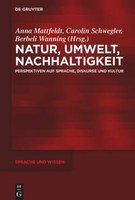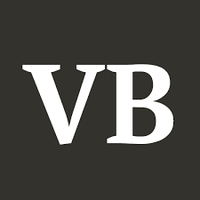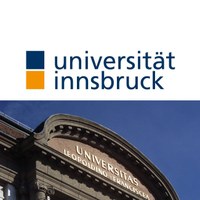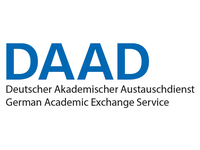Aktuelles
Dr. Johan Horst über Recht und Umwelt zwischen Schutz und Gestaltung
In der Neuerscheinung "Natur, Umwelt, Nachhaltigkeit. Perspektiven auf Sprache, Diskurse und Kultur" findet sich ein Beitrag von Dr. Johan Horst mit dem Titel "Recht und Umwelt zwischen Schutz und Gestaltung. Das Beispiel des Solar Radiation Managements"
Es gibt – so lautet in nuce die These dieses Aufsatzes – einen grundlegenden Wandel des Selbstverständnisses des Umweltvölkerrechts. Das Verhältnis von Normativität und Natürlichkeit wandelt sich von einem dichotomischen zu einem transformatorischen. Vor allem seit der Ausrufung des sogenannten Anthropozäns steht nicht mehr der Schutz einer als natürlich und unberührt empfundenen Natur im Vordergrund, sondern die Frage nach normativen Kriterien für die Gestaltung der Natur durch Recht. Dies findet seinen paradigmatischen Ausdruck in jüngeren regulatorischen Bemühungen des Umgangs mit Geoengineering, insbesondere des Solar Radiation Management (SRM). Dieses dient nicht mehr dem Schutz eines natürlichen Klimas, sondern der Erzeugung neuer klimatischer Verhältnisse. Dadurch stellen diese Maßnahmen das bisherige Selbstverständnis des Umweltvölkerrechts in Frage. Dies hat nicht zuletzt Konsequenzen für die Anforderungen, die an ein richtiges und gerechtes Recht der Gestaltung von Natürlichem gestellt werden. Am Beispiel der Regulierung des SRM zeichnet dieser Aufsatz die Herausforderungen dieses Wandels im Verhältnis von Normativität und Natürlichkeit nach. Zum Buch geht es hier.
CfA: Berlin Winter School on The Laws and Politics of (In)Security and Social Cohesion – An Interdisciplinary Conversation
From 1–3 December 2021, the LSI Berlin, in cooperation with the Centre Marc Bloch and the Centre for Socio-Legal Studies at the University of Oxford, will host the second Berlin Winter School for young scholars in interdisciplinary legal research. Application deadline is 1 September 2021.
About the Winter School
The Winter School The Laws and Politics of (In)Security and Social Cohesion – An Interdisciplinary Conversation seeks to engage in a debate about how (in)security has been constituted through law, history, social sciences, as well as natural sciences. We address the laws and politics of (in)security particularly in the areas of “terrorism”, pandemics, and environmental change and propose to rethink the entanglement and interaction between these crisis phenomena, and especially their effects on social inequalities and social cohesion.
The laws and politics of (in)security are understood not only as a framework for or a result of political and economic crises but also as a set of social practices that actively shape forms of inclusion and exclusion in society. As part of this, we ask how risk assessment, prognosis and uncertainty shape our understanding of dealing with (in)security: How do legal, political or social narratives around (in)security promote social cohesion, and to what extent might they instead endanger social cohesion? How do security laws, policies and practices find their way into the lives of people? What or who is considered a risk or threat to society? How do the laws and politics of (in)security confirm or constrain, stabilize or destabilize the public realm, its actors, actions, narratives and images? Do these laws and politics operate in different ways at different scales (national, regional, international)? And who are the actors that influence and determine these sets of security laws and politics of (in)security? The focus on (in)security and social cohesion is one that explicitly enquires about social hierarchies in the (re)distribution of power in society: who benefits, who loses, who is harmed?
The Winter School invites researchers to think through contextual, historical, and geographic conjunctions in debates on security. We seek to reinvestigate the role of disciplines such as law, political science, criminology, forensic psychology, health sciences, and environmental sciences in shaping normative regulations. We want to study who the law and routinized security practices address or fail to address when they insert empirical knowledge, and how empirical knowledge overrides normative considerations and routinized practices. We are interested in understanding the inherent limits of empirical knowledge in normative decision-making in times of (in)security.
By bringing together different academic perspectives on the implicit and explicit relationships of the laws and practices of (in)security, the Winter School aims to shed light on a range of issues that remain under-researched within the respective disciplines in order to foster a dialogue on different methodological and theoretical approaches of socio-legal research. By shifting perspectives and leaving the comfort zone of their own academic fields, participants will engage in interdisciplinary approaches and will unlock the interdisciplinary potential of their work within the thematic realm of the laws and practices of (in)security.
The Winter School provides a space to discuss the participants’ projects with fellow PhD students, postdoctoral fellows and renowned scholars of socio-legal research from different academic traditions. Participants will be asked to submit a five-page paper about the research project prior to the Winter School, which will serve as a basis for in-depth peer-to-peer sessions in which participants will present their research and receive feedback from both fellow participants und senior researchers. Moreover, thematic, methodological and strategic academic topics are covered by workshops and panel discussions on socio-legal research and writing and publishing in an international context. A core feature of the programme will be the practical session on the analysis of legal texts, conducted by interdisciplinary teams from the organizing institutions.
The keynotes will be delivered by Prof. Dr. Didier Bigo (Professor of International Political Sociology at King’s College London and at Sciences Po, Paris) and Prof. Dr. Gabriele Metzler (Professor for the History of Western Europe and Transatlantic Relations at Humboldt-Universität zu Berlin).
Applications
PhD students from political, social and legal sciences as well as the humanities working theoretically and/or empirically or from the standpoint of legal doctrine on socio-legal questions on (in)security are invited to apply. We especially welcome applications dealing with the laws and politics of (in)security in the areas of “terrorism”, pandemics, and environmental change.
The application deadline is 1 September 2021. Please submit your application by email to: winterschool21@cmb.hu-berlin.de. Participants will be selected and informed by 1 October 2021. Please note that there will be a small quota of participants who are selected directly by the organizing institutions. All participants are asked to submit a five-page paper about the research project by 1 November 2021.
The Winter School 2021 is planned as a live event to be held in Berlin. Should this be impossible due to the pandemic situation, the Winter School will be held online. The final decision will be made by mid-October 2021. The event will be conducted in English.
Your application should include
- Letter of motivation (max. 1 page)
- Brief synopsis of your project (max. 1 page)
- CV, including a publication list if applicable (max. 2 pages)
Costs and Fees
There are no application fees. If the Winter School takes place as a live event in Berlin (see below), travel expenses will be refunded within the limits of our budget, and accommodation for attendees not located in Berlin will be provided within the limits of our budget.
Contacts:
Centre Marc Bloch, Franco-German Centre for Social Science Research: Dr. Mathias Delori (mathias.delori@cmb.hu-berlin.de) and Dr. Judith Nora Hardt (judith.hardt@cmb.hu-berlin.de)
Integrative Research Institute Law & Society, Humboldt-Universität zu Berlin: Valentin Feneberg (valentin.feneberg@rewi.hu-berlin.de)
Centre for Socio-Legal Studies, University of Oxford: Dr. Bettina Lange (bettina.lange@csls.ox.ac.uk)
Grundrechte und Corona: Anna-Bettina Kaiser im Interview
LSI-Sprecherin Anna-Bettina Kaiser bilanziert im Interview mit dem Berliner Tagesspiegel die Einschränkung von Grundrechten in der Pandemie – und warnt vor einem Gewöhnungseffekt.
Kollektive Gefährdungslage Corona – Die Pandemie in der Asylrechtsprechung
LSI-Mitglied Valentin Feneberg und Paul Pettersson (Universität Halle-Wittenberg) analysieren in der aktuellen Ausgabe der Zeitschrift für Ausländerrecht und Ausländerpolitik (ZAR) die Rolle der Pandemie in der deutschen Asylrechtsprechung am Beispiel Afghanistan. Eine Kurzversion des Textes ist im Verfassungsblog erschienen.
Book Launch: Ran Hirschl - City, State: Constitutionalism and the Megacity, Oxford, Oxford University Press, 2020
3. November 2021, 18:00: Book Launch with Ran Hirschl in cooperation with Centre Marc Bloch, Integrative Research Institute Law & Society (LSI) (HU Berlin), Center for Global Constitutionalism (Wissenschaftszentrum Berlin)
Online Book Launch - 3 November 2021 at 18:00
More than half of the world’s population lives in cities; by 2050, it will be more than three quarters. Projections suggest that megacities of 50 million or even 100 million inhabitants will emerge by the end of the century, mostly in the Global South. This shift marks a major and unprecedented transformation of the organization of society, both spatially and geopolitically. Our constitutional institutions and imagination, however, have failed to keep pace with this new reality. Cities have remained virtually absent from constitutional law and constitutional thought, not to mention from comparative constitutional studies more generally. As the world is urbanizing at an extraordinary rate, this book argues, new thinking about constitutionalism and urbanization is desperately needed. In six chapters, the book considers the reasons for the “constitutional blind spot” concerning the metropolis, probes the constitutional relationship between states and (mega)cities worldwide, examines patterns of constitutional change and stalemate in city status, and aims to carve a new place for the city in constitutional thought, constitutional law, and constitutional practice.
Further information here.
Präsidentin von Kosovo zu Gast an der HU
Die Präsidentin der Republik Kosovo, Vjosa Osmani, war auf Einladung der Abteilung Internationales und des Integrative Research Insitute Law & Society (LSI) am 15. September 2021 zu Gast an der HU Berlin.
Die Präsidentin der Republik Kosovo, Vjosa Osmani, hat Berlin besucht. Neben einem Treffen mit Bundespräsident Frank-Walter Steinmeier im Schloss Bellevue war sie auf Einladung der Abteilung Internationales und des Integrative Research Institute Law & Society (LSI) am 15. September 2021 zu Gast an der HU Berlin.
Wichtiger Programmpunkt an der HU war eine von Prof. Dr. Silvia von Steinsdorff moderierte Gesprächsrunde mit Präsidentin Osmani und Vertreter:innen der HU zum Thema “Staatsbildung und Transformation in Kosovo: Prioritäten und Herausforderungen“. In ihrer Einführungsrede stellte Präsidentin Osmani insbesondere die Bedeutung von Bildung, Gesundheit, Gerechtigkeit und der Wahrung des Rechtsstaatlichkeitsprinzip für die gesellschaftliche, politische und wirtschaftliche Entwicklung von Kosovo in den Vordergrund. Als ausgebildete Juristin und Politikerin sprach sie zudem ausführlich über die Bedeutung des Aufbaus einer unabhängigen Justiz und der Entpolitisierung des Justizsystems – Themen, die auch im Zentrum des Forschungsprojekts "Constitutionalism under Stress: Comparative Perspectives (CONSTRESS)" stehen, dass das LSI gemeinsam mit der Princeton University durchführt.
How can asylum law and courts be studied?
At a workshop at Humboldt-Universität zu Berlin, researchers discussed different disciplinary approaches to the study of asylum law and courts in preparation of a Special Issue of the German Journal of Forced Migration and Refugee Studies (Zeitschrift für Flucht- und Flüchtlingsforschung – Z’Flucht).
The study of asylum law and its practical implementation at court in a multi- or even interdisciplinary way greatly benefits from the assembly of a variety of disciplinary voices and hearing their dialogue. To achieve this, Valentin Feneberg and Petra Sußner (both of Humboldt-Universität zu Berlin) organised a workshop entitled Flucht vor Recht – Flucht ins Recht? Empirisch-interdisziplinäre Asylrechtsforschung am Schauplatz Gericht (Fleeing from law – fleeing to law? Empirical and interdisciplinary research on asylum law and courts) at the Integrative Research Institute Law & Society (LSI) Berlin on 30 September & 1 October 2021. The event was co-hosted by Olaf Kleist and Zeynep Yanasmayan (German Center for Integration and Migration Research, DeZIM), the ‘Politics and Law’ research group of the German Political Science Association (DVPW), and the 'Refugee Law' research group of the German Network for Forced Migration Studies. For many participants, it was the first in-person workshop after one and a half years of Covid-induced physical distancing, and thus an ideal occasion for in-depth exchange and discussion of the topic. The manuscripts presented at the workshop will form the basis of a special issue of the German Journal of Forced Migration and Refugee Studies (Zeitschrift für Flucht- und Flüchtlingsforschung – Z’Flucht).
In their keynote, Cathryn Costello and Jessica Breaugh from the Centre for Fundamental Rights at the Hertie School in Berlin discussed the empirical study of refugee recognition processes and the particular challenges of studying UNHCR mandate Refugee Status Determination (RSD). On then one hand, they introduced surveys of decision-makers and others as a data source in general, and the research design of the RegMig survey examining the workings of UNHCR mandate RSD, on the other. The latter aims to shed light to the – so far understudied – practices of UNHCR, acknowledging the practical and normative importance of this institution for refugee recognition globally.
Johanna Günther (University of Hildesheim) and Lena Riemer (Yale University) both approached the case law of the European Court of Human Rights (ECtHR) from different disciplinary and methodological angles. Johanna Günther analysed the impact of the ECtHR on European asylum policy from a political science point of view, showing how the decision in M.S.S. v. Belgium and Greece on the prohibition of torture influenced changes to the Dublin system of the European Union. Conducting a mainly doctrinal approach, Lena Riemer set out how the interpretation of the collective expulsion prohibition by the ECtHR changed during the last decade to a more regressive approach, culminating in 2020 in its N.D. and N.T. v. Spain judgment on Spain’s policy of ‘hot returns’. Although using different methodological toolkits, both papers consider the court as embedded in a broader institutional setting which needs to be considered in order to evaluate the role of courts beyond individual decisions.
Nicole Hoellerer and Nick Gill from the ASYFAIR project at the University of Exeter shared their vast experiences of asylum courts as ethnographic research sites. Together with their colleagues from their project, they observed more than 450 court hearings in five European countries. They discussed the utility of legal ethnography at asylum appeal courts, the challenges of ethnographic research at some of them, as well as the advantages and disadvantages of such an approach. Their research demonstrates that one must literally enter the ‘black box’ of court to see how the law works in practice and to do justice both to those who apply it and those who are affected by it.
Taking into account the context of the work of courts, Constantin Hruschka (MPI for Social Law and Social Policy) shared his analysis of the ‘legislative hyperactivity’ in Germany, where, since 2014/2015, the German legislature has adopted more than 35 amendments to the Residence and Asylum Act. The analysis focussed on the link between these changes and the underlying migration management framework, describing a turn from an inclusionary to an exclusionary legal framework, emphasising the return of migrants and securitization instead of integration and asylum seekers’ well-being.
The ‘summer of migration’ of 2015 did not only lead to crucial legislative changes but also fostered the development of Refugee Law Clinics in Germany. In their paper, Mailin Loock and Sophie Greilich (both University of Hamburg) connected this development with the emergence of Law Clinics in other countries and discussed how these organisations could contribute to asylum seekers’ access to rights, as well as in how far they have the potential to generate valuable synergies by linking academia, practice and civil society.
Janna Wessels (Vrije Universiteit Amsterdam) contributed a workshop-in-a-workshop on discourse analysis of legal doctrine in refugee law research, using her work on so-called ‘discretion reasoning’ (recently published with Cambridge University Press) as a case study. Following an introduction to discourse analysis, participants were asked to read and discuss case law from France, Germany and the UK, and to identify ‘discretion reasoning’ by courts and the form in which it appears. The exercise revealed how differently courts argue when it comes to acts and the ‘identity’ of claimants applying for asylum based on persecution due to their sexual orientation, and showed how doctrinal reasoning can be deconstructed by applying discourse analysis, and why this method can be an important extension to doctrinal and content analysis.
In sum, the workshop confirmed that the study of the “plurality of interpretative voices” (Costello 2015) in the asylum regime requires a plurality of disciplinary perspectives, but also highlighted the challenge of developing a truly inter-disciplinary approach which is more than just a juxtaposition of these perspectives. In an ongoing dialogue between editors and authors, further work on the Special Issue will address this challenge and seek answers to questions that the workshop brought to light but could not yet fully answer.
Asylrechtsprechung nach der Machtübernahme der Taliban
In einem Beitrag für den Verfassungsblog untersuchen Valentin Feneberg (LSI Berlin) und Paul Pettersson (Martin-Luther-Universität Halle-Wittenberg) die deutsche Rechtsprechung nach der Machtübernahme der Taliban in Afghanistan und machen Vorschläge für eine einheitlichere Entscheidungspraxis der Gerichte
Verwaltungsgerichte korrigieren in großer Zahl Asylbescheide des Bundesamts für Migration und Flüchtlinge, insbesondere seit dem Ausbruch der Corona-Pandemie 2020 und jüngst seit der Machtübernahme der Taliban. Da die Recht-sprechung zu diesen „kollektiven Gefährdungslagen“ weiterhin uneinheitlich ist, bedarf es einer systematischeren Veröffentlichungspraxis, transparenteren Ur-teilsbegründungen und einer stärkeren wissenschaftlichen Begleitung.
CfA: Doctoral Programme Law & Society of the LSI
The doctoral programme Law & Society of the LSI in cooperation with the Berlin Graduate School of Social Sciences (BGSS) is currently accepting applications for two doctoral scholarships at Humboldt-Universität zu Berlin funded by the German Academic Exchange Service (DAAD, Graduate School Scholarship Programme).
The LSI and the Berlin Graduate School of Social Sciences (BGSS) have established the joint doctoral programme Law & Society to promote innovative interdisciplinary legal research funded by the German Academic Exchange Service (DAAD, Graduate School Scholarship Programme). The programme is dedicated to investigating the role and function of law for tackling the current and fundamental challenges for a democratic global society (inter alia climate change, digital transformation, the rise of populism and the decline of the rule of law) from a genuinely interdisciplinary perspective. The programme offers interdisciplinary supervision and support of the doctoral students within the international structured doctoral programme of the BGSS. The LSI is a stimulating interdisciplinary and international research environment in the heart of Berlin at Humboldt-University.
The courses of the doctoral programme will be taught in English. However, applicants are expected to acquire a working knowledge of German. Fully funded language courses will be available as part of the doctoral scholarship. The doctoral thesis may be written in English or German.
Application deadline: March 31, 2022
For all application requirements and more informations find the full Call for Applications here.
Thomas F. Remington: The Ordoliberalism Debate
On 1 February 2022 at 6pm, Thomas F. Remington will take the publication of several books in recent years dealing with the subject of ordoliberalism as an opportunity to reconsider the body of ideas associated with ordoliberalism. His talk will be part of LSI's "Landscapes of Equality" lecture series.
The publication of several books in recent years dealing with the subject of ordoliberalism offers an occasion to reconsider the body of ideas associated with ordoliberalism. In this talk, I undertake two tasks: first, to clarify what the term properly refers to and in particular how it is related to 'neoliberalism', and second, to consider its relevance to the liberalizing economic policies undertaken in the United States, Russia and China since the late 1970s, including its implications for anti-trust and anti-monopoly law. I argue that much of the recent discussion of ordoliberalism and neoliberalism overlooks important differences between early ordoliberal thought and neoliberalism as it evolved over time. I believe that a better understanding of ordoliberalism can also provide insights relevant to the contemporary debates about the crisis of liberal democracy and capitalism. Does ordoliberalism in fact offer a 'third way' for ordering a market economy in democracy?
Thomas F. Remington is Visiting Professor of Government at Harvard University. He is Goodrich C. White Professor (Emeritus) of Political Science at Emory University and a Senior Research Associate of the International Center for the Study of Institutions and Development of the Higher School of Economics in Moscow, Russia. He is author of a number of books and articles. Among his books are Presidential Decrees in Russia: A Comparative Perspective (Cambridge University Press, 2014) and The Politics of Inequality in Russia (Cambridge University Press, 2011). His research focuses on the political sources of economic inequality in the United States, Russia, China and Germany
Online, Anmeldung: lsi(at)rewi.hu-berlin.de
Regulating Extremes: Climate Change
Die Vortragsreihe ab Februar 2022 befasst sich mit Zielen und Herausforderungen von rechtlicher Gestaltung in der Klimakrise.
Der Klimawandel erhöht die Gefahr von Naturkatastrophen, schädigt Ökosysteme und verschärft humanitäre Krisen weltweit. Der Kampf gegen die Erderwärmung ist eine der zentralen Herausforderung des 21. Jahrhunderts. Die Erwartungen (auch) an das Recht sind daher hoch: Recht kann Motor einer gesellschaftlichen Transformation sein, die notwendig ist, um in naher Zukunft drohende extreme Freiheitsbeschränkungen abzuwenden. Es kann zudem durch Verteilungsverfahren individuelle Folgen des Klimawandels abmildern. Doch das Recht stößt insbesondere an praktische, politische, soziale und dogmatische Grenzen. In der interdisziplinären Vortragsreihe diskutieren wir über Ziele und Herausforderungen von rechtlicher Gestaltung in der Klimakrise.
Die Vortragsreihe ist Teil des Forschungsverbunds The Laws of Social Cohesion des Integrative Research Institute Law & Society, des Freie Universität Empirical Legal Studies Center (FUELS) und Recht im Kontext. The Laws of Social Cohesion wird im Rahmen der Grand Challenge Initiative Social Cohesion von der Berlin University Alliance gefördert.
Social Cohesion des Integrative Research Institute Law & Society, des Freie Universität Empirical Legal Studies Center (FUELS) und Recht im Kontext. The Laws of Social Cohesion wird im Rahmen der Grand Challenge Initiative Social Cohesion von der Berlin University Alliance gefördert.
Das Programm zur Reihe ist hier zu finden.
Kai Ambos: Protecting the Environment through a Crime of Ecocide?
On 22.02.2022 Kai Ambos will talk about the recent proposal by the Independent Expert Panel for the Legal Definition of Ecocide (IEP) to create a core international crime of ecocide. This talk will be part of LSI' lecture series Regulating Extremes: Climate Change.
The recent proposal by the Independent Expert Panel for the Legal Definition of Ecocide (IEP) to create a core international crime of ecocide – as a further core crime of the Rome Statute of the International Criminal Court – displays great confidence in the regulatory potential of criminal law. However, as will be demonstrated in this talk, the proposal suffers from serious shortcomings, lacks sufficient reasoning and the drafters offer practitioners little help with the intricate problems arising from their draft definition.
Kai Ambos ist Professor für Straf- und Strafprozessrecht, Rechtsvergleichung, internationales Strafrecht und Völkerrecht und Leiter der Abteilung für ausländisches und internationales Strafrecht, Institut für Kriminalwissenschaften, an der Georg August Universität, Göttingen. Er ist zudem Richter am Kosovo Sondertribunal und Berater (amicus curiae) der kolumbianischen Sondergerichtsbarkeit für den Frieden.
Der Vortrag ist Teil der Vortragsreihe Regulating Extremes: Climate Change.
Die Aufzeichnung des Vortrags finden Sie hier.
Save the Date: Fünfter Kongress der deutschsprachigen Rechtssoziologie-Vereinigungen 20.-23. September 2023
2023 findet der fünfte Kongress der deutschsprachigen Rechtssoziologie-Vereinigungen statt. Das Thema: Zugänge zum Recht – zugängliche Rechte?
Weitere Informationen finden Sie auf der Konferenz-Homepage, wo auch zeitnah der Call for Papers veröffentlicht wird: https://www.recht-und-gesellschaft.info/innsbruck2023/index.html
CfA: Doctoral Programme Law & Society of the LSI
The doctoral programme Law & Society of the LSI in cooperation with the Berlin Graduate School of Social Sciences (BGSS) is currently accepting applications for two doctoral scholarships at Humboldt-Universität zu Berlin funded by the German Academic Exchange Service (DAAD, Graduate School Scholarship Programme).
The LSI and the Berlin Graduate School of Social Sciences (BGSS) have established the joint doctoral programme Law & Society to promote innovative interdisciplinary legal research funded by the German Academic Exchange Service (DAAD, Graduate School Scholarship Programme). The programme is dedicated to investigating the role and function of law for tackling the current and fundamental challenges for a democratic global society (inter alia climate change, digital transformation, the rise of populism and the decline of the rule of law) from a genuinely interdisciplinary perspective. The programme offers interdisciplinary supervision and support of the doctoral students within the international structured doctoral programme of the BGSS. The LSI is a stimulating interdisciplinary and international research environment in the heart of Berlin at Humboldt-University.
The courses of the doctoral programme will be taught in English. However, applicants are expected to acquire a working knowledge of German. Fully funded language courses will be available as part of the doctoral scholarship. The doctoral thesis may be written in English or German.
Application deadline: March 31, 2022
For all application requirements and more informations find the full Call for Applications here.
New Website: The Laws of Social Cohesion
LSC is an interdisciplinary project in which scholars from the humanities, law, and social sciences work together to investigate issues that affect the role of law in social cohesion.
Law is a social practice that actively shapes social coexistence. The Laws of Social Cohesion charts the manyfold ways in which the law affects social cohesion: How can it promote integration, inclusion and societal discourse? Where are the limits of its integrative capacity? To what extent does it prevent participation and drives society further apart? LSC is an interdisciplinary research endeavor at the intersection of law and the social sciences. It is a joint project of the Integrative Research Institute Law & Society (LSI) of Humboldt University, the Freie Universität Empirical Legal Studies Center (FUELS), and Humboldt University's research network Recht im Kontext.
Click here for the website.
Javiera Barandiarán: Environmental Memory and Regulation: Reflections from Lithium-Rich Salt Flats
This talk shares work in progress which reviews what scientists know of the interactions between the knowledge about lithium-rich salt flats and its regulation, its historical context, and some of the consequences for climate change.
Salt flats are the remnants of terminal lakes, where the water that once lay there seeped underground or evaporated into the atmosphere. Salt flats today are receiving renewed attention from the mining industry as a source of low-cost lithium, a soft, white metal used in electric vehicles. This mining boom is putting salt flats, and their surrounding ecosystems, under environmental stress. This talk shares work in progress which reviews what scientists know of this stress and the interactions between this knowledge and regulation, its historical context, and some of the consequences for climate change. Drawing on the writings of geologists and scientists, as well as regulatory environmental studies, the analysis reflects on the underlying views of nature that inform these writings and ongoing debates about the sustainability of salt flat mining. Existing regulation fails to adequately protect salt flats due in part to its conceptual commitments to the present and future, at the expense of environmental historical memory, as evidenced in the views of nature held by different scientists.
Javiera Barandiarán is an associate professor in the Global Studies Program at the University of California, Santa Barbara. She received her BA from the University of Edinburgh and PhD in environmental science, policy, and management at the University of California, Berkeley. Barandiarán is the author of Science and Environment in Chile: The Politics of Expert Advice in a Neoliberal Democracy (MIT, 2018) and has published widely in journals such as Environmental Politics, Journal of Political Ecology, and Latin American Research Review. Her work has been supported by the Mellon Foundation, Social Science Research Council, and the National Science Foundation, among others. She is a fellow at The American Academy in Berlin.
This event is part of the lecture series Regulating Extremes: Climate Change.
















